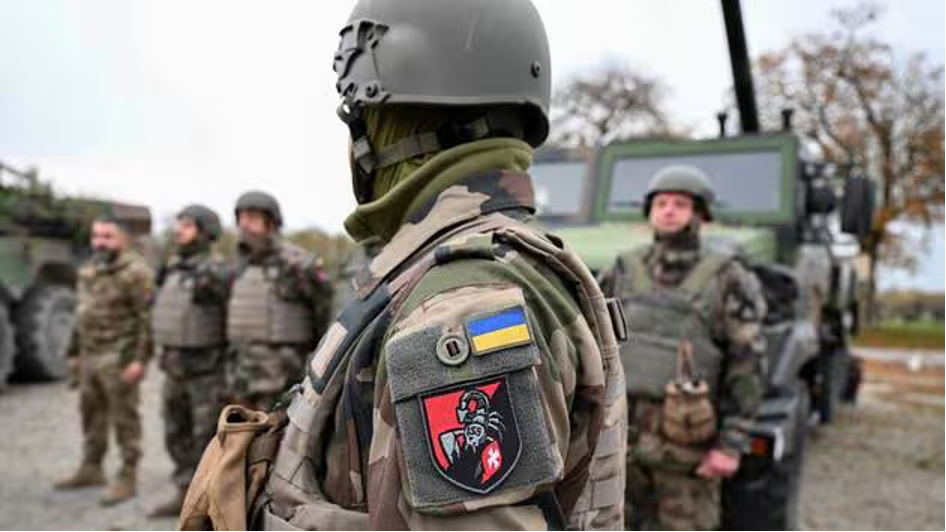Brian Mefford enters the hipster Kyiv cafe wearing a classically-tailored, khaki-colored American trench coat. He jokes that, after 24 years of living in Kyiv, he’s still single-handedly trying to bring old-fashioned Yankee fashion here.
During Russia’s full-scale invasion, Mefford founded and has led Help UkraineOperation Palyanytsya an a nonprofit group that evacuates people from front-line positions and now continues to provide humanitarian aid to conflict-zone communities.
JOIN US ON TELEGRAM
Follow our coverage of the war on the @Kyivpost_official.
It’s very clear, though, that the native Arkansan, after decades of living and working as a strategic consultant in Ukraine, retains his roots and relationships in the U.S.. That includes his connection to the Republican Party, in which he has been active since 1988, including as an adviser to his state’s governor and one-time presidential candidate Mike Huckabee.
Following remarks earlier this week by Florida Republican Gov. Ron DeSantis and a likely presidential contender that Ukraine is simply part of a “territorial dispute” and questioning U.S. aid levels, Mefford has unique insight about the Republican party and Ukraine policy.
Have Gov. DeSantis' recent comments put U.S. support for Ukraine at substantive risk? Should Ukrainian leaders worry about his statement?
No. The governor of Florida has no jurisdiction over U.S. foreign policy or Ukraine. He is a potential,but not yet announced candidate, for the Republican presidential nomination next year. If he wins the [Republican party] primary election and then wins the general (two big "if's") then, maybe, it’s a matter of concern. However, what candidates say in a primary when appealing to the base voters, versus what they say in the general election when appealing to the center, and then what they do if actually elected, is often three different matters.

‘We Are Not Going to Just Surrender and Give Up Our Independence’ – Ukraine at War Update for Dec. 18
Nothing DeSantis said was pro-Russian which contrasts with some backbench Republican members of Congress. Second, his comments largely downplayed Ukraine as a priority for America. Given that Ukraine has no electoral votes and foreign policy is rarely a vote winner, this is not surprising. Third, he gave safe and cautious answers to the questions. For example, he said “no blank checks”, but as a fiscally conservative governor, he doesn’t give blank checks anyway.
The one comment that that was concerning was his reference to Russia’s invasion of Ukraine being a “territorial dispute”. In the best case, he has merely repeated Russian talking points that have managed to contaminate the mainstream media discussion. In the worst case, he believes it’s indeed a territorial dispute rather than an issue of sovereignty. More likely, like many Americans, DeSantis simply doesn’t know the facts.
Other senior Republicans have now effectively 'corrected' DeSantis, and there are primaries coming up. How do you see this internal dynamic about Ukraine playing out?
The fact that Florida’s senior Sen. Marco Rubio corrected DeSantis on the Ukraine issue is a positive sign. I read it as an indicator that the Governor is still formulating his opinion on the issue. Governors don’t deal much with foreign policy, but senators do. The GOP Senate leadership has often been more hawkish on arming Ukraine than the White House and has criticized President Joe Biden for slow walking weapons to Ukraine.
That main dynamic with regard to Ukraine in the GOP presidential primary will simply be [former President Donald] Trump’s isolationism versus his main opponent’s position. It is unlikely though that Ukraine will be a decisive issue for Republican primary voters.
If you were directly advising GOP politicians on Ukraine, what policy principles would you be advising?
The GOP is the party of “peace through strength” and pro-defense industry. We need to prioritize our principles first, our paychecks second and our party third.
When President Biden is right on an issue, like I believe he is on Ukraine, we need to be supportive and be constructive. When the President is wrong – and he often is –we need to oppose him, but oppose him based on principles of conservatism rather partisanship.
When talking to Republican voters, much of the opposition to Ukraine is rooted in the fact that Biden supports Ukraine rather than any policy or principle. It’s primarily “Biden is for it so I am against it.” Republicans should be owning the Ukraine issue and criticizing Biden, not for giving another $50 billion to Ukraine, but rather for not giving $100 billion and F16’s [multi-role jets] to Ukraine.
Russia has been a threat to American interests for the last 75 years. We should not suddenly be wobbly on Russia in the hopes of scoring some petty political points.
What would ex-President Ronald Reagan be saying about Ukraine and what would he be saying to other Republicans?
President Ronald Reagan always had strong support in the Ukrainian American community. Many of the arguments used against greater US support of Ukraine are similar to ones used against him as President. These include nonsense about if “we are too tough on the Russians, they will use nuclear weapons”, “we need to give the Russians an off ramp to avoid them losing face”, “we are pulling the US into a confrontation” etc. All of those arguments were thrown against Reagan and all proven flawed.
I believe President Reagan would be reminding Republicans (and European leaders) of the words from his 1964 ‘Time for the Choosing’ speech, the advice from which is particularly apt in the case of Russia’s invasion of Ukraine. He said: “We cannot buy our security, our freedom from the threat of the bomb by committing an immorality so great as saying to a billion human beings now enslaved behind the Iron Curtain, ‘Give up your dreams of freedom because to save our own skins, we’re willing to make a deal with your slave masters’…Now, let’s set the record straight. There’s no argument over the choice between peace and war, but there’s only one guaranteed way you can have peace - and you can have it in the next second – surrender. Admittedly, there’s a risk in any course we follow other than this, but every lesson of history tell us that the greater risk lies in appeasement.”
It has been suggested that Ukraine policy is now entirely played out through red/blue divide. How should Ukraine manage the risks of that?
The unfortunate partisan polarization of the U.S. is partly due to Russian efforts to disseminate disinformation, contaminate media streams with conspiracies, and provoke divisions within American society. Ukraine must be careful in navigating this environment to avoid becoming a partisan casualty.
Specifically, Ukraine needs to avoid any perceived or otherwise interference in US domestic politics and stick to a strict bipartisan approach to Ukraine’s interests. Playing political favorites is a recipe for causing Ukraine long term damage.
This means keeping the focus on weapons, humanitarian aid, NATO membership, and avoiding any hint of preference on American social or economic policies. In addition, while Ukraine needs to continue to cultivate its relationship with the Biden White House, it also must cultivate its relationship with Speaker McCarthy, Senate Minority Leader Mitch McConnell, Republican leaders in the House and Senate, and even the leading Republican presidential campaigns. Finally, Ukraine needs to present a unified front abroad. There are certainly many domestic political divisions in Ukraine, but when that dirty laundry gets aired in the US, it will quickly fan the flames of Ukraine fatigue.
Will the MAGA wing prevail on Ukraine policy?
We will know next spring after the primaries. The Republican electorate is generally split evenly between Trump isolationists and Reaganite idealists, the latter who strongly support Ukraine.
For those of us living and working in Ukraine, it’s sometimes inconceivable how anyone wouldn’t be on Ukraine’s side and when we hear something that isn’t entirely supportive, we take it personally. This in turn causes us to sometimes lose perspective on the magnitude of the matter.
For example, much has been made out of last May’s vote when 57 Republican Representatives and 11 Senators voted against aid to Ukraine. Its rightly a concern, but when you consider that 149 Republican Representatives and 39 Senators voted for Ukraine aid, the size of the opposition is not particularly significant.
Time will tell, but I believe the majority of Republicans will continue to support Ukraine and be on the right side of history.
You can also highlight the text and press Ctrl + Enter






